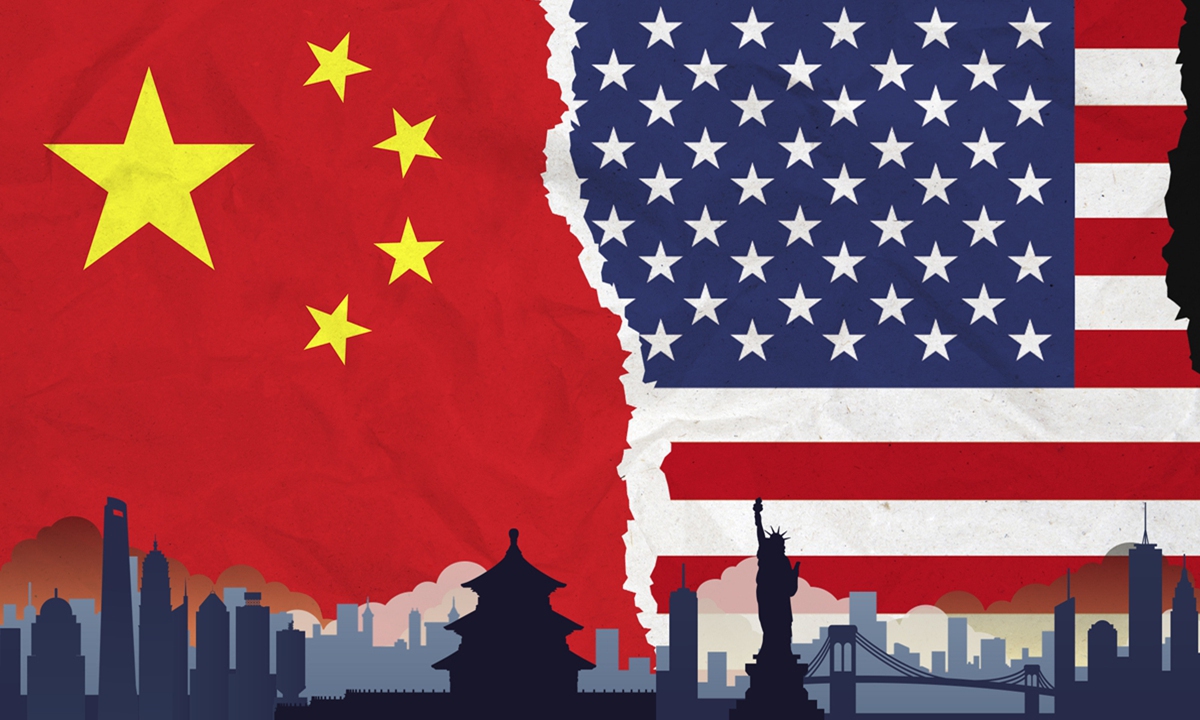
China-US Graphic: GT
The Office of the United States Trade Representative (USTR) has
removed Tencent's WeChat from its so-called Notorious Markets List for 2024, according to the USTR Office's website on Wednesday. Tencent was included in the 2023 list.
However, a number of Chinese internet products and companies are still listed, such as e-commerce and social commerce markets Taobao, DHGate and Pinduoduo, as well as the cloud storage service Baidu Wangpan. The 2024 list "reflects the evolving nature of counterfeit sales in China by identifying the social commerce platform Douyin Mall, owned by ByteDance, for the first time," according to the USTR's office.
Tencent had declined to comment as of press time. DHGate, Taobao and Baidu had not replied as of press time.
It is worth noting that although Tencent's WeChat was removed from the USTR's list, Tencent - among several Chinese tech companies, including CATL and SenseTime - was added to a list of firms that the US claimed to have working relationships with the Chinese military, according to a document published by the US Department of Defense on Monday.
"The US is now in a complex period of power transition, and the different lists may reflect the struggle for power among departments. This situation will lead to inconsistency and unpredictability in policies, posing challenges to the internationalization strategies of Chinese and global companies," Li Yong, a senior research fellow at the China Association of International Trade, told the Global Times on Thursday.
"The removal of Tencent and the addition of Tencent to different lists of different departments - seemingly contradictory policies - demonstrate intragovernmental divergence within the US," Zhang Xiaorong, director of the Beijing-based Cutting-Edge Technology Research Institute, told the Global Times on Thursday.
The USTR claimed that "the Notorious Markets List highlights online and physical markets that reportedly engage in or facilitate substantial trademark counterfeiting or copyright piracy."
USTR first identified notorious markets in the Special 301 Report in 2006. Since February 2011, USTR has published annually the Notorious Markets List separately from the Special 301 Report.
The USTR Office has long listed some Chinese internet products on the list of notorious markets. In terms of judging criteria, ambiguous terms such as "allegedly" and "reportedly" are often used, lacking solid evidence and detailed analysis, Zhang pointed out. "The Pentagon list is even more lax, with poorly defined and confusing procedures and errors in recent years."
Back in 2023, a spokesperson for China's commerce ministry said that the US listed some enterprises and markets from China, but claimed that "the Notorious Markets List does not make findings of legal violations nor does it reflect the US government's analysis of the general intellectual property (IP) protection and enforcement climate in the countries connected with the listed markets."
"The so-called Notorious Markets List of the US is obviously politicized, rather than fact-based, and has now become a tool to stigmatize Chinese companies," Zhang said, noting that it also overlooks the continuous progress that China has made in protecting IP rights.
China had 4.756 million valid domestic invention patents as of the end of 2024. The number of valid invention patents in strategic emerging industries reached 1.349 million, a year-on-year increase of 15.7 percent, according to statistics from the China National Intellectual Property Administration (CNIPA).
Applications from China under the Patent Cooperation Treaty, the Madrid System for international trademarks and the Hague System all rank among the top in the world, said an official of the CNIPA.
China ranks 11th among the 133 economies featured in the Global Innovation Index (GII) 2024. Meanwhile, China, with 26 such clusters, led for a second consecutive year in the number of top 100 science and technology clusters of GII, according to a report released by the World Intellectual Property Organization in October.
China has always attached great importance to IPR protection, and its achievements in recent years are obvious to all. Meanwhile, facts and data fully reflect the recognition of foreign enterprises toward China's IPR protection efforts.
From January to October of 2024, foreign entities were granted 92,000 invention patents in China, marking a 5.3 percent increase year-on-year. During the same period, trademark registrations by foreign entities in China stood at 121,000, up by 13.1 percent year-on-year, according to the latest statistics from CNIPA.
The 2024 International Association for the Protection of Intellectual Property (AIPPI) World Congress was held in East China's Hangzhou in October, which marks the
first time that the congress was held in China since the AIPPI was established 127 years ago.




